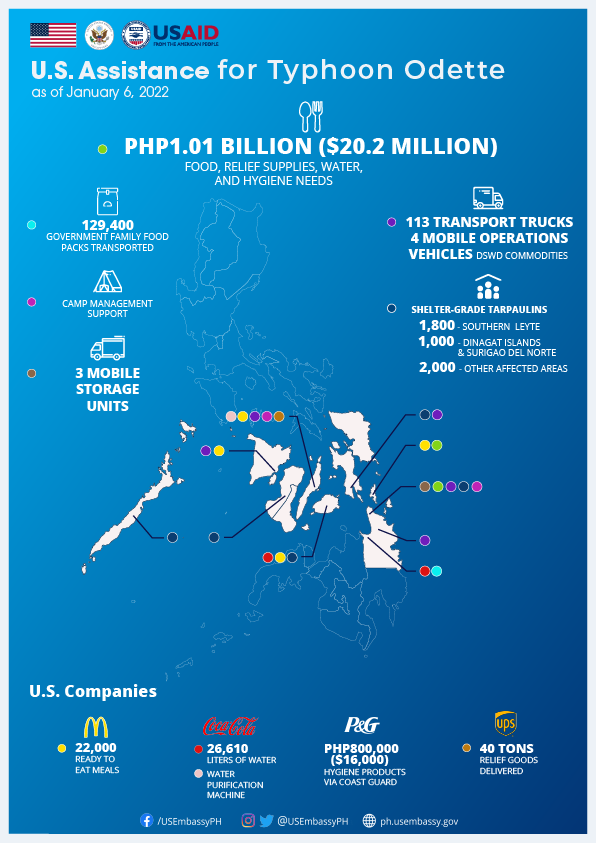The United States total worth of assistance to the current relief efforts and response to the impact of Super Typhoon Odette (Rai) has ballooned to $20.2 million or P1.01 billion.
The United States Agency for International Development Bureau for Humanitarian Assistance (USAID/BHA), in its Jan. 6 report, said that it allocated $19 million in humanitarian assistance to support communities hit by the typhoon.
This is on top of the initial $1.2 million provided to the United Nations’ World Food Program (UN WFP) and the non-government organization (NGO) Acción contra el Hambre/Spain (ACH/Spain) in late December.
“With a total contribution of approximately $20.2 million to date, USAID/BHA assistance will support UN and NGO partners to deliver emergency food, protection programming, shelter, and water, sanitation, and hygiene (WASH) assistance,” it said.

As of Jan. 7, a total of 7,712,948 or 2,182,791 families have been affected by the typhoon which hit the country in mid-December 2021. It also left 402 reported deaths and 78 missing.
The estimated worth of damages to agriculture and infrastructure has already reached P 8,868,707,729.93 and P17,537,327,310.05, respectively. At least 1,242,809 houses were partially or completely damaged.
Shelter
As of Jan. 6, the UN has given shelter-grade tarps to nearly 4,800 households, while the ACH/Spain provides shelter assistance to around 1,000 displaced households across the Caraga region utilizing US funds.
Through the USAID/BHA support, the International Organization for Migration (IOM) likewise deployed technical advisors and relief commodities to support the Philippine government camp management and coordination across Caraga, Central Visayas, and Eastern Visayas.
Water, sanitation, and hygiene (WASH)
Approximately 8,000 water disinfectants, 7,400 household hygiene kits, 7,100 water containers, and two water treatment units have been distributed across Caraga through water, sanitation, and hygiene (WASH) cluster partners worldwide.
With US support, the IOM has also been raising access to sanitation facilities, delivering drinking water and hygiene supplies, and providing information on hygiene and COVID-19 prevention.
A total of 72 bottles of water treatment solution have been distributed to Siargao authorities as of Jan 3. by the ACH/Spain.
Health assistance
Around 1.6 million water purification tablets, over 1 million surgical masks, and health kits for the three-month medical needs of 10,000 people were handed out by health cluster partners of USAID.
Training is also underway for mental and psychosocial support services. Joint international efforts are expected to benefit 519,300 individuals for their health needs.
Food security, agriculture aid
Emergency food assistance will also be provided to around 5,000 individuals across CAraga’s Dinagat Islands and Surigao del Norte.
Moreover, food security clusters will be assessing typhoon-related damages to agricultural lands and fisheries.
The clusters are working to implement programs for the restoration of agricultural and fisheries-based livelihoods.
Logistics, emergency telecomms
WFP, in coordination with GPH, will be providing logistics support for humanitarian operations.
The WFP, as of Jan. 5, has mobilized 113 trucks to transport DSWD relief goods and commodities all across Caraga, Central Visayas, Mimaropa, and Western Visayas, as well as Luzon Island.
The WFP also procured 12 mobile storage units as well as operationalized a generator to establish an emergency logistics hub in Surigao City.
Communications hubs have also been operationalized in six areas to facilitate the delivery of assistance and response efforts.
These areas include Agusan del Norte Province’s Butuan city, Cebu Province’s Alegria municipality, Dinagat Islands, and Negros Occidental Province’s Sipalay city, Surigao city, and Surigao del Norte Province’s Siargao Island.- AG,PG-bny
